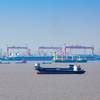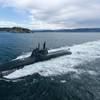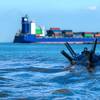INTERTANKO applauds IMO Secretary General Mitropoulos’s initiative to propose to the IMO Marine Environment Protection Committee (MEPC) a study group which, he stressed, will ensure that a decision on the revision of Annex VI keeps on track to meet the implementation target date of 2010. At the same time the Association welcomes the action at the IMO’s Bulk Liquids and Gas (BLG) Sub-committee this week to retain marine distillates as a viable option in the revisions to MARPOL Annex VI,.
“The Secretary General’s initiative will maintain the target deadline for the revision of MARPOL Annex VI and assist in keeping in check European and U.S. threats to take unilateral action to reduce harmful air pollution”, says INTERTANKO Managing Director Dr Peter Swift.
Air pollution from ships has jumped to the top of the political agenda, with other transport and land-based pollution sources already having achieved meaningful air pollution reductions. The pressure is on the shipping industry to move quickly and decisively to ensure that we maintain comprehensive, long-term international rules and avoid impatient decisions to regulate regionally and unilaterally. “A proactive approach is essential,” adds Swift.
Last November INTERTANKO tabled a proposal to ensure that the IMO had a complete and open discussion of all possible options – a proposal which would achieve the reduction goals that are expected of our industry, based on current, proven, technology and practical measures available today.
Specifically INTERTANKO suggested switching to the use of distillate fuels, typically marine diesel oil, with a global sulphur content cap introduced in a two stage programme, initially with a maximum sulphur content of 1.0%, then at a later date for new ships a maximum sulphur content of 0.5%. Additionally INTERTANKO advocated the implementation of a global Sulphur Emission Control Area (SECA) and in parallel the establishment of an appropriate fuel specification standard.
In summary, the adoption of these measures, which could be applied with relative ease to all ships , including existing ships, would lead to a significant lowering of sulphur oxide (SOx) and particulate matter (PM) emissions and a measurable reduction in nitrogen oxides (NOx). Further reductions in NOx emissions may be readily achieved in the future through in-engine technology.
“The use of distillate fuels would achieve a long-term goal to reduce emissions from ships in a holistic fashion and at the same time will reduce the operational complexity of ships,” says INTERTANKO Technical Director Dragos Rauta. “It is also the only alternative which, in addition to reducing SOx, NOx and PM emissions, will give a measurable lowering of CO2 emissions from ship operations.”
INTERTANKO is pleased to see that the BLG Subcommittee has placed this proposal (the C option) as one of the principal options for discussion. This reaffirms the unanimous endorsement given last month by the Association’s Council to champion this so-called distillates option.
There are challenges related to the availability and cost of marine distillates and equally of low sulphur residual fuels, as well as over the alternative of the fitting and operation of pollution abatement systems and the disposal of their toxic wastes – not least for existing ships. This is why INTERTANKO applauds the Secretary General’s initiative which, as well as keeping Annex VI revisions on track time-wise, will help to clear up uncertainties and points of confusion, will make supporting evidence public, and will provide unambiguous facts and figures. This will put an end to any misinformation or disinformation circulating around the industry.
Sponsored Content
Chris-Marine’s solutions help to prolong engine lifetime

Subscribe for
Maritime Reporter E-News
Maritime Reporter E-News is the maritime industry's largest circulation and most authoritative ENews Service, delivered to your Email five times per week










